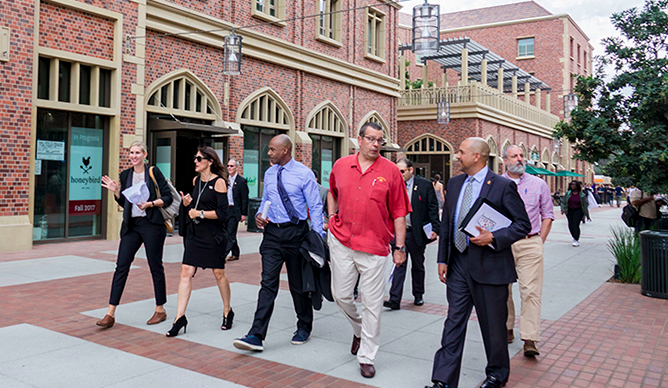By Matthew Kredell

The USC Price School of Public Policy partnered with the California Contract Cities Association (CCCA) and the Municipal Management Association of Southern California on Nov. 16 to host the first annual City Managers’ Summit, which addressed a range of topics from innovative performance evaluation approaches to community policing.
The impetus for the event originated when Mark Alexander, a Price MPA alumnus who serves as city manager for La Canada Flintridge and chairs the city manager’s committee for the CCCA, went to Professor Frank Zerunyan with a request. As director of executive education for the USC Bedrosian Center on Governance, Zerunyan has helped about 300 city mayors and council members advance in their careers as public servants over the past five years. Alexander wanted to focus Zerunyan’s expertise on the people who run the day-to-day operations of a city.
“It’s natural for us to help practitioners with improving not only the policy side, but the implementation side as well,” Zerunyan said. “The city managers implement policy in our municipalities, and we want to be able to assist with both ends of that spectrum.”
More than 70 city managers from around Southern California gathered at the USC Radisson for a half-day of discussions on issues of interest to their profession.
Assessing public performance
Zerunyan led sessions on the State of the Service Survey that he and his colleague Professor Bill Resh are conducting, as well as an innovative approach to city manager performance evaluation that he is using as mayor of Rolling Hills Estates. Zerunyan was joined on the latter panel by the long-time city manager of Rolling Hills Estates Doug Prichard.
The two-year comparative study seeks to assess how local public servants fare on a variety of critical concepts in public management, how public servants perceive fairness, bureaucracy, citizen engagement, race and gender biases.
“What we’re trying to do is figure out municipality success or failure through surveying their employees,” Zerunyan said. “We can then provide feedback to municipalities, especially city managers, about their work force regarding levels of satisfaction and emotional burnout, and more importantly how to recruit, educate and retain public servants.”

